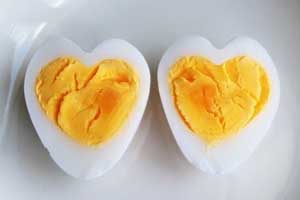- Home
- Editorial
- News
- Practice Guidelines
- Anesthesiology Guidelines
- Cancer Guidelines
- Cardiac Sciences Guidelines
- Critical Care Guidelines
- Dentistry Guidelines
- Dermatology Guidelines
- Diabetes and Endo Guidelines
- Diagnostics Guidelines
- ENT Guidelines
- Featured Practice Guidelines
- Gastroenterology Guidelines
- Geriatrics Guidelines
- Medicine Guidelines
- Nephrology Guidelines
- Neurosciences Guidelines
- Obs and Gynae Guidelines
- Ophthalmology Guidelines
- Orthopaedics Guidelines
- Paediatrics Guidelines
- Psychiatry Guidelines
- Pulmonology Guidelines
- Radiology Guidelines
- Surgery Guidelines
- Urology Guidelines
Consume eggs daily to keep cardiovascular diseases at bay: Study

People who indulge in a moderate level of egg consumption (up to <1 egg/day) have a lower risk of cardiovascular diseases (CVDs) as compared to people who consume no eggs, according to a study published in the journal Heart. The research was carried out on more than 400,000 Chinese adults.
Liming Li, a professor from School of Public Health, Peking University Health Science Center, China, and colleagues conducted the study to examine the associations between egg consumption and cardiovascular disease (CVD), ischaemic heart disease (IHD), major coronary events (MCE), hemorrhagic stroke as well as ischaemic stroke.
CVD is the leading cause of disability and death worldwide, mostly due to ischaemic heart disease and stroke (including both hemorrhagic and ischaemic stroke).
Eggs are a prominent source of dietary cholesterol, but they also contain high-quality protein, many vitamins and bioactive components such as phospholipids and carotenoids. Previous studies have been inconsistent, and most of them observed insignificant associations between egg consumption and coronary heart disease (CHD) or stroke.
For the study, the researchers used data from China Kadoorie Biobank (CKB) study which is an ongoing prospective study involving around half a million (512,891) adults aged 30 to 79 from 10 different geographical areas in China. The present study focused on 416,213 participants who were free of prior cancer, CVD, and diabetes.
From that group at a median follow-up of 8.9 years, a total of 83,977 cases of CVD and 9,985 CVD deaths were documented, as well as 5,103 major coronary events. At the start of the study period, 13.1% of participants reported daily consumption (usual amount 0.76 egg/day) and 9.1% reported never or very rare consumption
Key Findings:
- The daily egg consumers (up to one egg/day) had a 26% lower risk of hemorrhagic stroke, a 28% lower risk of hemorrhagic stroke death and an 18% lower risk of CVD death.
- There was a 12% reduction in risk of ischaemic heart disease observed for people consuming eggs daily (estimated amount 5.32 eggs/week), when compared with the 'never/rarely' consumption category (2.03 eggs/week).
- Overall, compared with non-consumers, daily egg consumption was associated with lower risk of CVD.
This was an observational study, so no firm conclusions can be drawn about cause and effect, but the authors said their study had a large sample size and took into account established and potential risk factors for CVD.
"Our findings suggested that daily egg consumption (<1 egg) was associated with lower risk of CVD, IHD, MCE, haemorrhagic stroke and ischaemic stroke among Chinese middle-aged adults. Our findings contribute scientific evidence to the dietary guidelines with regard to egg consumption for the healthy Chinese adult," concluded the authors.
For further information click on the link: http://dx.doi.org/10.1136/heartjnl-2017-312651

Disclaimer: This site is primarily intended for healthcare professionals. Any content/information on this website does not replace the advice of medical and/or health professionals and should not be construed as medical/diagnostic advice/endorsement or prescription. Use of this site is subject to our terms of use, privacy policy, advertisement policy. © 2020 Minerva Medical Treatment Pvt Ltd